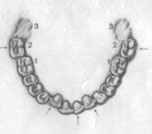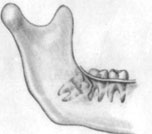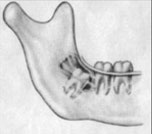Wisdom teeth
Who needs wisdom tooth surgery?
Eruption of the wisdom teeth tends to be the most erratic of all human teeth but should ordinarily be completed by mid-twenties. Many people will not have enough space in their mouths to allow for wisdom teeth and will consequently have these teeth mal-positioned. This may be a source of trouble.
An impacted tooth simply means a tooth that has not been able to erupt into a proper and functional position. It can take several forms depending on its angulation but is divided broadly into those that are held back in the bone and those that cannot negotiate the soft tissues.
Problematic wisdom teeth should be dealt with as soon as possible before they could allow for complications to develop.
You will have a consultation during which Dr Younessi will explain all the advantages and disadvantages of surgery, and candidly discuss the surgical operation, plan the most appropriate treatment, discuss potential risks, and arrange for the appropriate mode of anaesthesia.
Potential Problems of Impacted Wisdom Teeth
Pericoronitis
This is infection of the soft tissue envelope around an erupting tooth. Plaque and food particles accumulate under this flap and become infected. Pain and swelling can ensue.
Crowding

Pressure of the wisdom tooth against adjacent teeth is said to push one tooth after another, much like dominos, to the extent that the front teeth can be crowded. There can be a feeling of fullness and pain as a consequence.
 Much the same way that adult teeth destroy the roots of baby teeth to cause them to fall out and occupy their place, the wisdom teeth can destroy the adjacent molars.
Much the same way that adult teeth destroy the roots of baby teeth to cause them to fall out and occupy their place, the wisdom teeth can destroy the adjacent molars.

These fluid–filled sacs are innocent but can expand and empty out the bone even to the extent of causing easy fracturing of the jaw bones. They can worsen crowding by pressure on the adjacent teeth.
Surgery to remove Wisdom Teeth
Appropriate cuts are made in the gums which are peeled back to identify and remove a small rim of the jaw bone. This allows for the delivery of the teeth which are often divided in the interest of preserving normal healthy adjacent structures. The wound is repaired and held in place by stitches. Dr Younessi usually uses dissolving stitches that are designed to unravel and fall apart when they are no longer needed.
The surgical procedure is performed under one of the following methods of anaesthesia chosen to suite your individual needs:
1) General Anaesthesia is given by a specialist anaesthetist in the hospital. It is initiated commonly by an injection and continued by breathing the anaesthetic gases.
For the patient with a real aversion to needles, the anaesthetic can sometimes, at the discretion of the anaesthetist, be started by gaseous means.
This mode of anaesthesia allows for the patient to be completely unconscious and consequently totally unaware of the procedure. It is appropriate to those people who are or can be made medically fit to receive it, those who are anxious or unhappy about being awake during the surgery and those whose wisdom teeth are difficult.
General anaesthesia requires a minimum of six hours fasting prior to the procedure. Afterwards a responsible adult must care for you until you are well enough.
2) Local Anaesthesia is delivered by a needle near the site of surgery and the appropriate tissues are made numb. There will be no “sharp” sensations but the feel of pressure cannot be removed. Some people find the sound of the drill objectionable or simply dislike the idea of being awake for the procedure. These people may be candidates for sedation or a general anaesthetic.
3) Intravenous Sedation refers to delivery of anaesthetic agents that bring about a state of semi-conscious relaxation. The aim of the exercise is to bring the candidate who is willing but unable to tolerate the procedure into a state of being sufficiently relaxed to accept local anaesthetic injections. Many patients will also have no recollection of the surgery but this is variable. The greatest advantage of this mode of anaesthesia is probably that, being performed in the Rooms, does not carry the financial burden of a hospital admission fee. The requirement for fasting and an escort is as with a general anaesthetic.
What to do now?
If you feel you may benefit from wisdom tooth surgery or would just like to know more, arrange an appointment for a consultation. You should come with an OPG x-ray that displays your teeth, a summary of your medical history and a list of your medications as there may be interactions that you should be protected from.
You are encouraged to bring your friends and family along as they may have questions they may wish answered.
